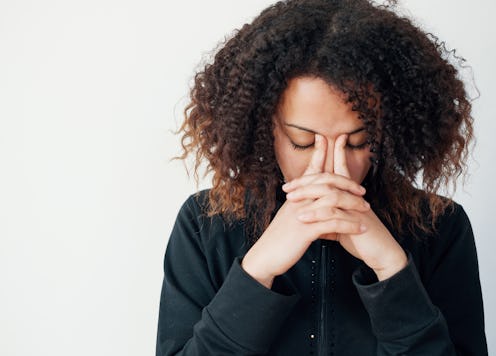Life
A Study Suggests That It Is How You Experience Grief, Not Age, That Determines Wisdom
The world is not lack for things that are disheartening, distressing, and downright awful. In times of tragedy, it can feel impossible to see past the immediate hurt and to look toward what lies ahead. However, a new study from Oregon State University provides a much needed beacon of hope, suggesting that the way we cope in difficult times influences our development of wisdom. In other words, what we learn in times of personal hardship is often a key component in shaping our perspective.
Published in the Journals of Gerontology: Series B, the study looked specifically the insight people gain in the context of adversity. Researchers interviewed 50 adults, aged 56 to 91, who’d experienced one or more challenging life events, like divorce, a health crisis, or the death of a loved one. Each participant was asked to describe this difficult life event, how they coped, and whether the experience affected their outlook on life.
“Difficult times are a way people define themselves.”
Researchers found that participants responded in one of three way. One group, comprised of 13 people, said the event did not shape their outlook on life, with some members in this group accepting the life event as “something that could not be changed.” Another response, given by five participants, said that the event reinforced a belief or clarified a way of thinking they’d already held before.
The largest group of people, 32 participants, said the event “disrupted” how they thought, their sense of personal meaning, and how they viewed the world.
“Difficult times are a way people define themselves,” Carolyn Aldwin, an expert on psychosocial factors influencing aging and a director of research at OSU, said in a release for the study. The study reinforces this idea, suggesting that tragedy is often a turning point in the way people see themselves and the world around them.
“What we’re really looking at is ‘when bad things happen, what happens?’” Aldwin continued. “The event can become a catalyst for changes that come afterward.”
The recent shooting at Marjory Stoneman Douglas High School in Parkland, Florida, which killed 17 people and injured another 14, has been met with the condolences and sorrow we’ve come to expect with this kind of tragedy, a routine we are unfortunately all-too-familiar with. It has also ignited a much-needed conversation on gun reform, one that feels different than previous discussions in part because it is being lead by the high school students who survived the shooting.
Student activists from Parkland are in our news feeds, on our televisions, and at our lawmakers’ doors demanding change and demonstrating exactly how that change can be enforced. Unfortunately, not everyone is ready to listen, with many writing the students off as “just teenagers.” Some conservative pundits, like Tomi Lahren and Bill O’Reilly, have questioned whether lawmakers should be listening to the Stoneman Douglas students, citing their young age as one of the reasons why.
“The adage used to be ‘with age comes wisdom,’ but that’s not really true,” said Aldwin. “Generally, the people who had to work to sort things out after a difficult life event are the ones who arrived at new meaning.”
Researchers from the study also found that social support played a great part in how people developed after a difficult life event. “It mattered whether a participant was expected to adjust to the event quickly and ‘get back to life,’ or whether they were encouraged to grow and change as a result of the event,” Heidi Igarashi, the study’s lead author, said. “The quality of the social interactions really make a difference.”
While this new study from OSU may not be entirely surprising — anyone who’s experienced any kind of hardship will tell you that it was pivotal in some regard — it does give us perspective on the current conversation around gun reform, how we should be supporting the survivors and who has the authority to lead the way.
